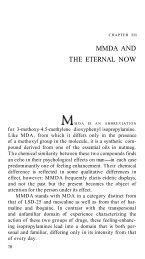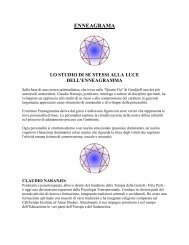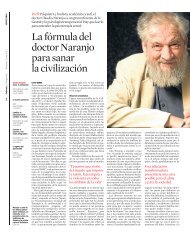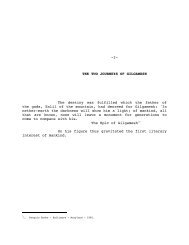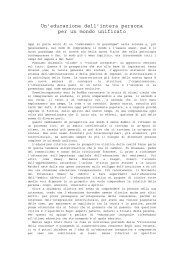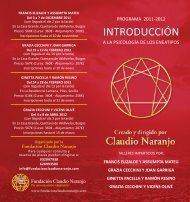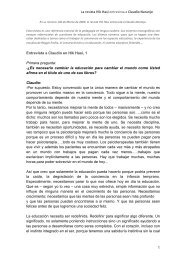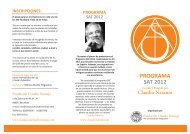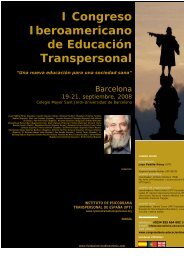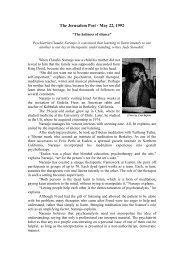Present – Centeredness in Gestalt Therapy Claudio Naranjo
Present – Centeredness in Gestalt Therapy Claudio Naranjo
Present – Centeredness in Gestalt Therapy Claudio Naranjo
Create successful ePaper yourself
Turn your PDF publications into a flip-book with our unique Google optimized e-Paper software.
<strong>Present</strong> <strong>–</strong> <strong>Centeredness</strong> <strong>in</strong> <strong>Gestalt</strong> <strong>Therapy</strong><br />
<strong>Claudio</strong> <strong>Naranjo</strong><br />
If we want to list the implicit moral <strong>in</strong>junctions of <strong>Gestalt</strong> therapy, the list may be longer or shorter<br />
accord<strong>in</strong>g to the level of generality or particularity of our analysis. Without claim<strong>in</strong>g to be systematic<br />
or thorough, here are some that may give an impressionistic notion of the style of life entailed:<br />
1. Live now. Be concerned with the present rather than with past or future.<br />
2. Live here. Deal with what is present rather than with what is absent.<br />
3. Stop imag<strong>in</strong><strong>in</strong>g. Experience the real.<br />
4. Stop unnecessary th<strong>in</strong>k<strong>in</strong>g. Rather, taste and see.<br />
5. Express rather than manipulate, expla<strong>in</strong>, justify, or judge.<br />
6. Give <strong>in</strong> to unpleasantness and pa<strong>in</strong> just as to pleasure. Do not restrict your awareness.<br />
7. Accept no should or ought other than your own. Adore no graven image.<br />
8. Take full responsibility for your actions, feel<strong>in</strong>gs, and thoughts.<br />
9. Surrender to be<strong>in</strong>g as you are.<br />
__________________________________________________<br />
Repr<strong>in</strong>ted by permission from Joen Fagan and Irma Lee Shepherd, eds., <strong>Gestalt</strong><br />
<strong>Therapy</strong> Now (Science and Behavior Books, Inc., 1970), pp. 47-69.<br />
The paradox that such <strong>in</strong>junctions may be part of a moral philosophy that precisely recommends<br />
giv<strong>in</strong>g up <strong>in</strong>junctions may be resolved if we look at them as statements of truth rather than duty.<br />
Responsibility, for <strong>in</strong>stance, is not a must, but an unavoidable fact: we are the responsible doers of<br />
whatever we do. Our only alternatives are to acknowledge such responsibility or deny it. All that<br />
<strong>Gestalt</strong> therapy is say<strong>in</strong>g is that by accept<strong>in</strong>g the truth (which amounts to a non-undo<strong>in</strong>g rather than<br />
a do<strong>in</strong>g) we are better off - awareness cures. Of course, it cures us of our lies.<br />
I th<strong>in</strong>k that the specific <strong>in</strong>junctions of <strong>Gestalt</strong> therapy may <strong>in</strong> turn be subsumed under more general<br />
pr<strong>in</strong>ciples. I would propose the follow<strong>in</strong>g three:<br />
1. Valuation of actuality: temporal (present versus past or future), spatial (present versus absent),<br />
and substantial (act versus symbol).<br />
2. Valuation of awareness and the acceptance of experience.<br />
3. Valuation of wholeness, or responsibility....
In the follow<strong>in</strong>g pages I will consider <strong>in</strong> some detail one of the aspects of actuality, <strong>in</strong> itself one<br />
aspect of the philosophy of life of <strong>Gestalt</strong> therapy. In choos<strong>in</strong>g liv<strong>in</strong>g-<strong>in</strong>-the-moment as a theme, I am<br />
not imply<strong>in</strong>g that this is more important than the issues of consciousness or responsibility, but only<br />
limit<strong>in</strong>g the scope of this paper to the subject on which I feel most <strong>in</strong>cl<strong>in</strong>ed to write at the moment. I<br />
th<strong>in</strong>k, too, that whatever the po<strong>in</strong>t of departure, the content will be somewhat similar, for the three<br />
issues are only superficially dist<strong>in</strong>ct. On close exam<strong>in</strong>ation we may discover, for <strong>in</strong>stance, that the<br />
question of actuality is not only related to the valuation of present tense and present locus, but also<br />
to the valu<strong>in</strong>g of concrete reality, sens<strong>in</strong>g and feel<strong>in</strong>g rather than th<strong>in</strong>k<strong>in</strong>g and imag<strong>in</strong><strong>in</strong>g, to<br />
awareness, and to self-determ<strong>in</strong>ation. More specifically, I hope that the follow<strong>in</strong>g pages will show that<br />
the will<strong>in</strong>gness to live <strong>in</strong> the moment is <strong>in</strong>separable from the question of openness to experience,<br />
trust <strong>in</strong> the work<strong>in</strong>gs of reality, discrim<strong>in</strong>ation between reality and fantasy, surrender of control and<br />
acceptance of potential frustration, a hedonistic outlook, and awareness of potential death. All these<br />
issues are facets of a s<strong>in</strong>gle experience of be<strong>in</strong>g-<strong>in</strong>-the-world, and look<strong>in</strong>g at such an experience from<br />
the perspective of presentcenteredness rather than other conceptual vantage po<strong>in</strong>ts amounts to an<br />
arbitrary choice....<br />
PRESENT-CENTEREDNESS AS TECHNIQUE<br />
There are at least two ways <strong>in</strong> which present-centeredness is reflected <strong>in</strong> the technical repertoire of<br />
<strong>Gestalt</strong> therapy. One is the outspoken request to the patient to attend to and express what enters<br />
his present field of awareness. This will most often be coupled with the <strong>in</strong>struction to suspend<br />
reason<strong>in</strong>g <strong>in</strong> favor of pure self-observation. The second is the presentification of the past or future<br />
(or fantasy <strong>in</strong> general). This may take the form of an <strong>in</strong>ward attempt to identify with or relive past<br />
events or, most often, a reenact<strong>in</strong>g of the scenes with gestural and postural participation as well as<br />
verbal exchanges, as <strong>in</strong> psychodrama.<br />
Both techniques have antecedents <strong>in</strong> spiritual discipl<strong>in</strong>es older than psychotherapy, and it could not<br />
be otherwise, given their importance. <strong>Present</strong>ification is found <strong>in</strong> the history of drama, magic, and<br />
ritual, and <strong>in</strong> the enact<strong>in</strong>g of dreams among some primitive people. Dwell<strong>in</strong>g <strong>in</strong> the present is the<br />
cornerstone of some forms of meditation. Yet both presentification and dwell<strong>in</strong>g <strong>in</strong> the present f<strong>in</strong>d<br />
<strong>in</strong> <strong>Gestalt</strong> therapy a dist<strong>in</strong>ctive embodiment and form of utilization that deserve discussion at length.<br />
In the follow<strong>in</strong>g pages I will concentrate on the approach called the exercise of the cont<strong>in</strong>uum of<br />
awareness. S<strong>in</strong>ce it is very much like a meditation translated <strong>in</strong>to words, and its role <strong>in</strong> <strong>Gestalt</strong><br />
therapy is comparable to that of free-association <strong>in</strong> psychoanalysis, I will deal with it mostly <strong>in</strong><br />
comparative terms.<br />
<strong>Gestalt</strong> <strong>Therapy</strong> and Meditation<br />
The practice of attention to present experience has had a place <strong>in</strong> several traditions of spiritual<br />
discipl<strong>in</strong>e. In Buddhism it is a corollary of "right- m<strong>in</strong>dfulness," one of the factors <strong>in</strong> the "Noble<br />
Eightfold Path." An aspect of right-m<strong>in</strong>dfulness is the practice of "bare attention":<br />
Bare Attention is concerned only with the present. It teaches what so many have forgotten: to live with<br />
full awareness <strong>in</strong> the Here and Now. It teaches us to face the present without try<strong>in</strong>g to escape <strong>in</strong>to<br />
thoughts about the past or the future. Past and future are, for average consciousness, not objects of<br />
observation, but of reflection. And, <strong>in</strong> ord<strong>in</strong>ary life, the past and the future are taken but rarely as
objects of truly wise reflection, but are mostly just objects of day-dream<strong>in</strong>g and va<strong>in</strong> imag<strong>in</strong><strong>in</strong>gs which<br />
are the ma<strong>in</strong> foes of Right M<strong>in</strong>dfulness, Right Understand<strong>in</strong>g and Right Action as well. Bare Attention,<br />
keep<strong>in</strong>g faithfully to its post of observation, watches calmly and without attachment the unceas<strong>in</strong>g<br />
march of time; it waits quietly for the th<strong>in</strong>gs of the future to appear before its eyes, thus to turn <strong>in</strong>to<br />
present objects and to vanish aga<strong>in</strong> <strong>in</strong>to the past. How much energy has been wasted by useless<br />
thoughts of the past: by long<strong>in</strong>g idly for bygone days, by va<strong>in</strong> regrets and repentance, and by the<br />
senseless and garrulous repetition, <strong>in</strong> word or thought, of all the banalities of the past! Of equal futility<br />
is much of the thought given to the future: va<strong>in</strong> hopes, fantastic plans and empty dreams, ungrounded<br />
fears and useless worries. All this is aga<strong>in</strong> a cause of avoidable sorrow and disappo<strong>in</strong>tment which can be<br />
elim<strong>in</strong>ated by Bare Attention (Nyaponika Thera, 1962, p. 41).<br />
Past and future do not qualify as "bare objects" <strong>in</strong> that they are <strong>in</strong> the nature of imag<strong>in</strong><strong>in</strong>g, but are<br />
also to be avoided because dwell<strong>in</strong>g <strong>in</strong> them entails a loss of freedom: illusion ensnares us <strong>in</strong> its<br />
recurrence. As Nyaponika Thera (1962, p. 41) says:<br />
Right M<strong>in</strong>dfulness recovers for man the lost pearl of his freedom, snatch<strong>in</strong>g it from the jaws of the<br />
dragon Time. Right M<strong>in</strong>dfulness cuts man loose from the fetters of the past which he foolishly tries<br />
even to re<strong>in</strong>force by look<strong>in</strong>g back to it too frequently, with eyes of long<strong>in</strong>g, resentment or regret.<br />
Right M<strong>in</strong>dfulness stops man from cha<strong>in</strong><strong>in</strong>g himself even now, through the imag<strong>in</strong>ations of his fears and<br />
hopes, to anticipated events of the future. Thus Right M<strong>in</strong>dfulness restores to man a freedom that is to<br />
be found only <strong>in</strong> the present.<br />
The most important practice related to the view <strong>in</strong> the quotation above is that form of meditation<br />
the Ch<strong>in</strong>ese call we-hs<strong>in</strong> (or idealessness), which consists, as Watts (1950, p. 176) puts it, <strong>in</strong> the<br />
ability to reta<strong>in</strong> one's normal and everyday consciousness and at the same time let go of it.<br />
That is to say, one beg<strong>in</strong>s to take an objective view of the stream of thoughts, impressions, feel<strong>in</strong>gs,<br />
and experiences which constantly flows through the m<strong>in</strong>d. Instead of try<strong>in</strong>g to control and <strong>in</strong>terfere<br />
with it, once simply lets it flow as it pleases. But whereas consciousness normally lets itself be carried<br />
away by the flow, <strong>in</strong> this case the important th<strong>in</strong>g is to watch the flow without be<strong>in</strong>g carried away ...<br />
one simply accepts experiences as they come without <strong>in</strong>terfer<strong>in</strong>g with them on the one hand or<br />
identify<strong>in</strong>g oneself with them on the other. One does not judge them, form theories about them, try to<br />
control them, or attempt to change their nature <strong>in</strong> any way; one lets them be free to be just exactly<br />
what they are. "The perfect man," said Chuang tzu," employs his m<strong>in</strong>d as a mirror; it grasps noth<strong>in</strong>g, it<br />
refuses noth<strong>in</strong>g, it receives but does not keep." This must be quite clearly dist<strong>in</strong>guished from mere<br />
empty-m<strong>in</strong>dedness on the one hand, and from ord<strong>in</strong>ary undiscipl<strong>in</strong>ed m<strong>in</strong>d-wander<strong>in</strong>g on the other.<br />
The practice of attention to the present <strong>in</strong> the context of <strong>Gestalt</strong> therapy is very much like<br />
verbalized meditation. Moreover it is a meditation carried <strong>in</strong>to the <strong>in</strong>terpersonal situation as an act of<br />
self-disclosure. This permits a monitor<strong>in</strong>g of the exercise by the therapist (which may be<br />
<strong>in</strong>dispensable to the <strong>in</strong>experienced) and may also add significance to the contents of awareness.<br />
I would not doubt that the search for words and the act of report<strong>in</strong>g can <strong>in</strong>terfere with certa<strong>in</strong> states<br />
of m<strong>in</strong>d; yet the act of expression also adds to the exercise <strong>in</strong> awareness, beyond its be<strong>in</strong>g merely a<br />
means of <strong>in</strong>formation for the therapist's <strong>in</strong>tervention. At least the follow<strong>in</strong>g advantages of<br />
communicated awareness over silent meditation may be listed:<br />
1 - The act of expression is a challenge to the sharpness of awareness. It is not quite true to say<br />
that we know someth<strong>in</strong>g but cannot put it <strong>in</strong>to words. Of course, words are mere words and we can
never put anyth<strong>in</strong>g <strong>in</strong>to words; yet, with<strong>in</strong> limits, clarity of perception goes together with the ability<br />
to express, an artist be<strong>in</strong>g a master <strong>in</strong> awareness rather than a skilled patternmaker. And <strong>in</strong> art, as <strong>in</strong><br />
psychotherapy, the task of hav<strong>in</strong>g to communicate someth<strong>in</strong>g <strong>in</strong>volves hav<strong>in</strong>g to really look at it<br />
rather than dream<strong>in</strong>g about look<strong>in</strong>g.<br />
2. The presence of a witness usually entails an enhancement both of attention and of the<br />
mean<strong>in</strong>gfulness of that which is observed. I th<strong>in</strong>k too that the more aware an observer is, the more<br />
our own attention is sharpened by his mere presence, as if consciousness were contagious or one<br />
person could not as easily avoid see<strong>in</strong>g what is exposed to the gaze of another.<br />
3. The contents of consciousness <strong>in</strong> an <strong>in</strong>terpersonal sett<strong>in</strong>g will naturally tend to be that of the<br />
<strong>in</strong>terpersonal relationship, whereas the solitary meditator focused on the here and now will<br />
systematically fail to f<strong>in</strong>d such contents <strong>in</strong> his field of awareness. S<strong>in</strong>ce it is ma<strong>in</strong>ly the patterns of<br />
relat<strong>in</strong>g and the self-image <strong>in</strong> the process of relat<strong>in</strong>g that are disturbed <strong>in</strong> psychopathological<br />
conditions, this factor looms large <strong>in</strong> mak<strong>in</strong>g the here-and-now exercise a therapy when <strong>in</strong> the I-thou<br />
sett<strong>in</strong>g.<br />
4. The <strong>in</strong>terpersonal situation makes present-centeredness more difficult, for it elicits projection,<br />
avoidance, and self-delusion <strong>in</strong> general. For <strong>in</strong>stance, what for the solitary meditator may be a series<br />
of observations of physical states may, <strong>in</strong> the context of communication, become embedded <strong>in</strong> a<br />
feel<strong>in</strong>g of anxiety about the therapist's eventual boredom, or <strong>in</strong> an assumption that such<br />
observations are trivial, or that they show the patient's essential barrenness. The elicitation of such<br />
feel<strong>in</strong>gs and fantasies is important.<br />
a. If present-centeredness is a desirable way of liv<strong>in</strong>g which is usually marred by the<br />
vicissitudes of <strong>in</strong>terpersonal relationships, the challenge of contact entails the ideal tra<strong>in</strong><strong>in</strong>g<br />
situation. I would like to <strong>in</strong>vite the thought that the practice of liv<strong>in</strong>g <strong>in</strong> the moment is truly an<br />
exercise and not merely an occasion for self-<strong>in</strong>sight. Just as <strong>in</strong> behavior therapy, this is a<br />
process of desensitization <strong>in</strong> the course of which a person becomes free of the central<br />
condition<strong>in</strong>g of avoid<strong>in</strong>g experience, and he learns that there is noth<strong>in</strong>g to fear.<br />
b. Related to the above is the fact that it is precisely the awareness of the difficulties <strong>in</strong><br />
presentcenteredness that can provide the first step toward overcom<strong>in</strong>g them. Experienc<strong>in</strong>g<br />
the compulsive quality of brood<strong>in</strong>g or plann<strong>in</strong>g may be <strong>in</strong>separable from an appreciation of the<br />
alternative to them, and of a true understand<strong>in</strong>g of the dist<strong>in</strong>ction between these states of<br />
m<strong>in</strong>d and present-centeredness.<br />
5. The therapeutic context allows for a monitor<strong>in</strong>g of the process of self-observation, whereby the<br />
therapist br<strong>in</strong>gs the patient back to the present when he has been distracted from it (that is, from<br />
himself). There are two ma<strong>in</strong> ways of do<strong>in</strong>g this. The simplest (aside from merely rem<strong>in</strong>d<strong>in</strong>g him of<br />
the task) is to call his attention to what he is do<strong>in</strong>g unawares, by direct<strong>in</strong>g his attention to aspects<br />
of his behavior that seem to be automatic response patterns or to clash with his <strong>in</strong>tentional actions.<br />
Simply be<strong>in</strong>g mirror to him may serve to br<strong>in</strong>g <strong>in</strong>to focus his relationship to himself and his actions <strong>in</strong><br />
general:<br />
P.: I don't know what to say now....
T.: I notice that you are look<strong>in</strong>g away from me.<br />
P.: (Giggle.)<br />
T.: And now you cover up your face.<br />
P.: You make me feel so awful!<br />
T.: And now you cover up your face with both hands.<br />
P.: Stop! This is unbearable!<br />
T.: What do you feel now?<br />
P.: I feel so embarrassed! Don't look at me!<br />
T.: Please stay with that embarrassment.<br />
P.: I have been liv<strong>in</strong>g with it all my life! I am ashamed of everyth<strong>in</strong>g I do! It is as if I don't even feel that I have<br />
the right to exist!<br />
An alternative to this process of simply reflect<strong>in</strong>g the patient's behavior is that of regard<strong>in</strong>g the<br />
occasions of failure <strong>in</strong> present-centeredness as cues to the patient's difficulties (or rather, liv<strong>in</strong>g<br />
samples thereof), just as <strong>in</strong> psychoanalysis the failure to free-associate is the target of<br />
<strong>in</strong>terpretation. Instead of <strong>in</strong>terpretation, <strong>in</strong> <strong>Gestalt</strong> therapy we have explicitation: the request that<br />
the patient himself become aware of and express the experience underly<strong>in</strong>g his presentavoid<strong>in</strong>g<br />
behavior. One of the assumptions <strong>in</strong> <strong>Gestalt</strong> therapy is that present-centeredness is natural: at<br />
depth, liv<strong>in</strong>g <strong>in</strong> the moment is what we want most, and therefore deviations from the present are <strong>in</strong><br />
the nature of an avoidance or a compulsive sacrifice rather than random alternatives. Even if this<br />
assumption were not true of human communication <strong>in</strong> general, it is made true <strong>in</strong> <strong>Gestalt</strong> therapy by<br />
the request that the patient stay <strong>in</strong> the present. Under such a structure, deviations may be<br />
understood as failures, as a sabotag<strong>in</strong>g of the <strong>in</strong>tent, or as distrust <strong>in</strong> the whole approach and/or the<br />
psychotherapist.<br />
In practice, therefore, the therapist will not only coach the patient <strong>in</strong>to persistent attention to his<br />
ongo<strong>in</strong>g experience, but will especially encourage him to become aware and to express his experience<br />
at the po<strong>in</strong>t of fail<strong>in</strong>g at the task....<br />
The Cont<strong>in</strong>uum of Awareness and Asceticism<br />
It may be a psychological truth that a person can hardly atta<strong>in</strong> present-centeredness while<br />
remember<strong>in</strong>g, before hav<strong>in</strong>g known the taste of it <strong>in</strong> the easier situation of rem<strong>in</strong>iscence-deprivation.<br />
The same may be parenthetically said on the matter of contact<strong>in</strong>g one's experience while th<strong>in</strong>k<strong>in</strong>g.<br />
Ord<strong>in</strong>arily, th<strong>in</strong>k<strong>in</strong>g dispels the awareness of the self-<strong>in</strong>-the-activity-as-th<strong>in</strong>ker and the feel<strong>in</strong>gs<br />
constitut<strong>in</strong>g the ground of the th<strong>in</strong>k<strong>in</strong>g-motivation, just as the sun dur<strong>in</strong>g the daytime prevents our<br />
see<strong>in</strong>g the stars. The experience of th<strong>in</strong>k<strong>in</strong>g and not be<strong>in</strong>g lost <strong>in</strong> thought (that is, caught up <strong>in</strong> the<br />
exclusive awareness of the figure <strong>in</strong> the totality of figureground) is a condition that can be brought<br />
about most easily by contact<strong>in</strong>g such experience-ground <strong>in</strong> moments of thoughtlessness. In this the
<strong>Gestalt</strong> therapy techniques of suspend<strong>in</strong>g rem<strong>in</strong>iscence, anticipation, and th<strong>in</strong>k<strong>in</strong>g fall <strong>in</strong> with the<br />
implicit philosophy of asceticism <strong>in</strong> general: certa<strong>in</strong> deprivations are undergone <strong>in</strong> order to contact<br />
what is currently hidden by the psychological activity <strong>in</strong>volved <strong>in</strong> the renounced situations. This<br />
deprivation of sleep, talk<strong>in</strong>g, social communication, comfort, food, or sex is supposed to facilitate the<br />
access to unusual states of consciousness but is not an end or ideal <strong>in</strong> itself.<br />
The practice of attention to the stream of life relates to asceticism <strong>in</strong> that it not only entails a<br />
voluntary suspension of ego-gratification, but also presents the person with the difficulty of<br />
function<strong>in</strong>g <strong>in</strong> a way that runs counter to habit. S<strong>in</strong>ce the only action allowed by the exercise is that<br />
of communicat<strong>in</strong>g the contents of awareness, this precludes the operation of "character" (that is,<br />
the organization of copy<strong>in</strong>g mechanisms) and even do<strong>in</strong>g as such....<br />
PRESENT-CENTEREDNESS AS PRESCRIPTION<br />
Not all that is of value as a psychological exercise need automatically be a good prescription for<br />
liv<strong>in</strong>g. Free association may be a useful exercise, but not necessarily the best approach to<br />
conversation, just as the headstand <strong>in</strong> Hatha Yoga need not be the best posture to be <strong>in</strong> most of the<br />
time. To a greater or lesser extent, techniques have a potential for be<strong>in</strong>g carried <strong>in</strong>to ord<strong>in</strong>ary life,<br />
thus mak<strong>in</strong>g of life the occasion for a growth endeavor. Yet it is not only the specific value of a<br />
certa<strong>in</strong> approach that makes it appropriate as a prescription, but its compatibility with other<br />
desirable purposes <strong>in</strong> life; the degree of clash that it will br<strong>in</strong>g about with the exist<strong>in</strong>g social structure<br />
and, especially, its compatibility with a conception of the good society. Thus the abreaction of<br />
hostility <strong>in</strong> a situation of no constra<strong>in</strong>ts can be of value <strong>in</strong> psychotherapy, but is this approach the<br />
one that would maximize sanity and well-be<strong>in</strong>g <strong>in</strong> a community? I th<strong>in</strong>k that op<strong>in</strong>ions on the matter<br />
would be divided. They would be divided even on the question of truth. Whereas aggression tends to<br />
be socially reproved and the commandment states, "Thou shalt not kill", truth is commonly regarded<br />
as virtue, and ly<strong>in</strong>g a s<strong>in</strong>. One might therefore expect that the technique of self-disclosure, valuable<br />
<strong>in</strong> the context of psychotherapy, would be immediately applicable to life. Given the ord<strong>in</strong>ary<br />
condition of humanity, though, truth has been and may cont<strong>in</strong>ue to be not only uncomfortable or<br />
<strong>in</strong>convenient but dangerous. The example of Socrates, Jesus Christ, or the heretics at the time of<br />
the Inquisition, po<strong>in</strong>t out that an unconditional embrac<strong>in</strong>g of truth may mean the acceptance of<br />
martyrdom, for which I am sure the average human be<strong>in</strong>g is not ready. The desire to turn feel<strong>in</strong>gs<br />
<strong>in</strong>to prescriptions <strong>in</strong> cases where society did not make such a project feasible has been one of the<br />
implicit or explicit rationales <strong>in</strong> the creation of special communities among those who share the goal<br />
of liv<strong>in</strong>g for the <strong>in</strong>ner quest. In such groups, sometimes veiled by secrecy, man has sought to live<br />
accord<strong>in</strong>g to pr<strong>in</strong>ciples not compatible with other than a monastic, therapeutic, or otherwise special<br />
sett<strong>in</strong>g.<br />
Humanistic Hedonism<br />
Liv<strong>in</strong>g <strong>in</strong> the moment, <strong>in</strong> contrast to other techniques, seems a perfectly appropriate prescription for<br />
life. Moreover, it appears to be more <strong>in</strong> the nature of a technicalization of a life formula than the<br />
prescrib<strong>in</strong>g of a technique. The idea of prescription may evoke images such as that of the<br />
bad-smell<strong>in</strong>g tonic that children were frequently compelled to take "for their own good," before the<br />
time of gelat<strong>in</strong> capsules and flavor chemistry. This is part of a dualistic frame of m<strong>in</strong>d <strong>in</strong> which "the<br />
good th<strong>in</strong>gs" seem different from the "th<strong>in</strong>gs for our good," and the goal of self-perfect<strong>in</strong>g seems
someth<strong>in</strong>g other than "merely liv<strong>in</strong>g."<br />
This is not what the classic <strong>in</strong>junctions of present-centeredness convey. Take, for <strong>in</strong>stance, K<strong>in</strong>g<br />
Solomon's "A man hath no better th<strong>in</strong>g under the sun, than to eat, and to dr<strong>in</strong>k, and to be merry<br />
[Eccles. 15].” The character of this quotation, like that of most statements that stress the value of<br />
actuality, is hedonistic. And it could not be otherwise, for if the value of the present is not go<strong>in</strong>g to<br />
be for a future, it must be <strong>in</strong>tr<strong>in</strong>sic: the present must conta<strong>in</strong> its own reward.<br />
In our times the hedonistic outlook seems to be divorced from and to run counter to religious feel<strong>in</strong>g<br />
(just as to "prescription orientation" <strong>in</strong> general). Insofar as "body" and "m<strong>in</strong>d" are regarded as<br />
<strong>in</strong>compatible sources of value, idealism and spirituality tend to be associated with a grim asceticism,<br />
while the defense of pleasure is most often undertaken by the cynically practical, tough-m<strong>in</strong>ded, and<br />
hard-nosed "realists." This does not seem to have always been so, and we know that there was a<br />
time when religious feasts were real festivals. So, when we read Solomon's words <strong>in</strong> the Old<br />
Testament, we should not superimpose on them our present body-m<strong>in</strong>d split, or the<br />
tough-m<strong>in</strong>dedness with which those words are often repeated. Beh<strong>in</strong>d them was an outlook<br />
accord<strong>in</strong>g to which liv<strong>in</strong>g life and liv<strong>in</strong>g it now was a holy action, a way <strong>in</strong> accordance with God's will.<br />
Rarely do we f<strong>in</strong>d this balance of transcendence and immanence <strong>in</strong> Western thought, with the<br />
exception of remarkable <strong>in</strong>dividuals that seem to be marg<strong>in</strong>al to the spirit of the times - heretics to<br />
the religious, or madmen to the common folk. William Blake, for <strong>in</strong>stance, was such a man <strong>in</strong> claim<strong>in</strong>g<br />
that "eternity is <strong>in</strong> love with the productions of time."<br />
Even <strong>in</strong> psychoanalysis, which <strong>in</strong> practice has done much for mank<strong>in</strong>d's id, the "pleasure pr<strong>in</strong>ciple" is<br />
looked upon as a childishness and a nuisance that the "mature," reality-oriented ego must hold <strong>in</strong><br />
check.<br />
Contrariwise, <strong>Gestalt</strong> therapy sees a much stronger l<strong>in</strong>k between pleasure and goodness, so that its<br />
philosophy may be called hedonistic <strong>in</strong> the same sense as the good old hedonisms before the<br />
Christian era. I would like to suggest the notion of humanistic hedonism, which does not necessarily<br />
entail a theistic outlook and yet seems to dist<strong>in</strong>guish this approach from the egoistic hedonism of<br />
Hobbes, the utilitarian hedonism of J. S. Mill, and that of the ord<strong>in</strong>ary pleasure seeker. (If at this po<strong>in</strong>t<br />
the reader wonders how <strong>Gestalt</strong> therapy can be called ascetic and hedonistic at the same time, let<br />
him remember that <strong>in</strong> Epicurus's view the most pleasurable life was one devoted to philosophical<br />
reflection while on a simple diet of bread, milk, and cheese.) ...<br />
PRESENT-CENTEREDNESS AS IDEAL<br />
Der den Augenblick ergreift/Das ist der rechte Mann.<br />
He who seizes the moment is the right man.<br />
Goethe<br />
The word ideal needs clarification. Ideals are frequently understood with a connotation of duty<br />
and/or <strong>in</strong>tr<strong>in</strong>sic goodness that is foreign to the philosophy of <strong>Gestalt</strong> therapy. If we deprive an ideal<br />
of its quality of should or ought, it rema<strong>in</strong>s as either a statement of the desirable way to an end -<br />
that is, a prescription - or else a "rightness." By this I mean an expression of goodness rather than a<br />
means or an <strong>in</strong>junction: a sign or symptom of an optimal condition of life. This is the sense <strong>in</strong> which
we may speak of ideals <strong>in</strong> Taoism, for <strong>in</strong>stance, <strong>in</strong> spite of its be<strong>in</strong>g a philosophy of nonseek<strong>in</strong>g. In<br />
spite of its non<strong>in</strong>junctional style, the Tao Te Ch<strong>in</strong>g is always elaborat<strong>in</strong>g on the qualities of the sage:<br />
"For this reason the sage is concerned with the belly and not the eyes The sage is free from the<br />
disease because he recognizes the disease to be disease. . . . The sage knows without go<strong>in</strong>g about . .<br />
. accomplishes without any action," and so on. In the same sense, present-centeredness is regarded<br />
as an ideal <strong>in</strong> statements such as: "Now is the watchword of the wise."<br />
Some recipes for better liv<strong>in</strong>g are means to an end that differ from such an end <strong>in</strong> quality, but this is<br />
not true of present-centeredness. Here, as <strong>in</strong> <strong>Gestalt</strong> therapy <strong>in</strong> general, the means to an end is a<br />
shift<strong>in</strong>g to the end state right away: the way to happ<strong>in</strong>ess is that of start<strong>in</strong>g to be happy right away;<br />
the way to wisdom that of rel<strong>in</strong>quish<strong>in</strong>g foolishness at this very moment - just as the way to swim is<br />
the practice of swimm<strong>in</strong>g. The prescription of liv<strong>in</strong>g <strong>in</strong> the now is the consequence of the fact that<br />
we are liv<strong>in</strong>g <strong>in</strong> the now; this is someth<strong>in</strong>g that the sane person knows, but the neurotic does not<br />
realize while enmeshed <strong>in</strong> a dreamlike pseudo-existence.<br />
In Buddhism the now is not merely a spiritual exercise but the condition of the wise. In a passage of<br />
the Pali Canon, Buddha first utters the prescription:<br />
and then the ideal:<br />
Do not hark back to th<strong>in</strong>gs that passed,<br />
And for the future cherish no fond hopes:<br />
The past was left beh<strong>in</strong>d by thee,<br />
The future state has not yet come.<br />
But who with vision clear can see<br />
The present which is here and now<br />
Such wise one should aspire to w<strong>in</strong><br />
What never can be lost nor shaken.<br />
Whereas the Buddhist version of the now <strong>in</strong>junction stresses the illusor<strong>in</strong>ess of the alternatives, the<br />
Christian view stresses the trust and surrender entailed by presentcenteredness. When Jesus says, "'<br />
Take, therefore, no thought of the morrow, for the morrow shall take thought of the th<strong>in</strong>gs of<br />
itself," giv<strong>in</strong>g the example of the lilies of the fields [Matt. 6], he is not only say<strong>in</strong>g, "Don't act upon<br />
catastrophic expectations," but more positively, "Trust!" While the Christian version is framed <strong>in</strong> a<br />
theistic map of the universe, and trust means trust <strong>in</strong> the heavenly Father, the attitude is the same<br />
as that regarded as the ideal <strong>in</strong> <strong>Gestalt</strong> therapy, which may be rendered as trust <strong>in</strong> one's own<br />
capacities for cop<strong>in</strong>g with the now as it comes. The ideal of present-centeredness is one of<br />
experienc<strong>in</strong>g rather than manipulat<strong>in</strong>g, of be<strong>in</strong>g open to and accept<strong>in</strong>g experience rather than<br />
dwell<strong>in</strong>g <strong>in</strong>, and be<strong>in</strong>g defensive <strong>in</strong> the face of, possibility. Such attitudes bespeak two basic<br />
assumptions <strong>in</strong> the Weltanschauung of <strong>Gestalt</strong> therapy: th<strong>in</strong>gs at this moment are the only way that<br />
they can be; and behold, the world is very good!<br />
If the present cannot be other than it is, the wise will surrender to it. Furthermore if the world is<br />
good, why not, as Seneca puts it, "gladly take the gifts of the present hour and leave vex<strong>in</strong>g<br />
thoughts." To say of anyth<strong>in</strong>g that it is good is, of course, a statement alien to <strong>Gestalt</strong> therapy,<br />
which holds that th<strong>in</strong>gs can only be good to us. Whether they are depends on us and what we do
with our circumstances.<br />
Our current perception of existence is full of pa<strong>in</strong>, helplessness, and victimization. As Edmund Burke<br />
remarked over two centuries ago: "To compla<strong>in</strong> of the age we live <strong>in</strong>, to murmur of the present<br />
possessors of power, to lament the past, to conceive of extravagant hopes of the future are the<br />
common disposition of the greatest part of mank<strong>in</strong>d." In the view of <strong>Gestalt</strong> therapy, however, such<br />
compla<strong>in</strong>ts and lamentations are no more than a bad game we play with ourselves -- one more<br />
aspect of reject<strong>in</strong>g the potential bliss of now. At depth, we are where we want to be, we are do<strong>in</strong>g<br />
what we want to do, even when it amounts to apparent tragedy. If we can discover our freedom<br />
with<strong>in</strong> our slavery, we can also discover our essential joy under the cover of victimization.<br />
The whole process of estrangement from reality, as reality is given <strong>in</strong> the eternal now, may be<br />
conceived as one of not trust<strong>in</strong>g the goodness of the outcome, of imag<strong>in</strong><strong>in</strong>g a catastrophic<br />
experience or, at best, an empt<strong>in</strong>ess for which we compensate by creat<strong>in</strong>g a paradise of ideals,<br />
future expectations, or past glories. From such "idols" we keep look<strong>in</strong>g down on present reality,<br />
which never quite matches our constructs and therefore never looks perfect enough. This is how the<br />
question of present-centeredness ties <strong>in</strong> with accept<strong>in</strong>g experience rather than be<strong>in</strong>g judgmental.<br />
As Emerson said,<br />
These roses under my w<strong>in</strong>dow make no reference to former roses or to better ones; they are for what<br />
they are; they exist with God today. There is not time to them. There is simply the rose; it is perfect <strong>in</strong><br />
every moment of its existence ... but man postpones and remembers. He cannot be happy and strong<br />
until he, too, lives with nature <strong>in</strong> the present, above time.<br />
Search<strong>in</strong>g for the ideal rose, we don't see that each rose is the utmost perfection of itself. For fear<br />
of not f<strong>in</strong>d<strong>in</strong>g the rose we seek, we hang on to the concept of "rose" and never learn that "a rose is<br />
a rose is a rose." Our greed and impatience do not permit us to let go of the substitute through<br />
which we enjoy the reflection of reality <strong>in</strong> the form of promise or possibility, and by which we are at<br />
the same time cut off from present enjoyment. The <strong>in</strong>tuition of Paradise Lost and the Promised Land<br />
is better than total anesthesia, but short of the realization that they are right here. Omar Khayyám<br />
knew well:<br />
Here with a loaf of bread beneath the bough,<br />
A flask of w<strong>in</strong>e, a book of verse - and thou<br />
Beside me s<strong>in</strong>g<strong>in</strong>g <strong>in</strong> the wilderness -<br />
And wilderness is Paradise now.<br />
"How sweet is mortal sovereignty!" th<strong>in</strong>k some,<br />
Others, "How blest the Paradise to come!"<br />
Ah, take the cash <strong>in</strong> hand and waive the rest;<br />
Nor heed the music of a distant drum!<br />
Rubáiyát



